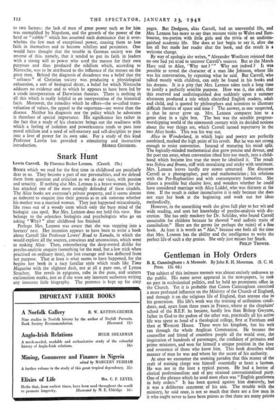Snark Hunt
Lewis Carroll. By Florence Becker Lennon. (Cassell. 15s.)
Booxs which we read for the first time in childhood are peculiarly dear to us. They become a part of our personalities, and we defend them from question and criticism as we do our vices, with passion and tenacity. If nothing else Mrs. Lennon is a brave woman, for she has attacked one of the most strongly defended of these citadels. The Alice books are everyone's private property, and it seems almost as indecent to enquire into their genesis as to ask someone whether his mother was a married woman. They just happened miraculously, like roses out of a woody stem which only the busy mind of the biologist can spoil. But Mrs. Lednon does not hold this view. She belongs to the relentless biologists and psychologists who go on asking " Why? " after childhood has finished.
Perhaps Mrs. Lennon was aware that she was stepping into a hornets' nest. Her intention appears to have been to write a book about Carroll like Professor Lowes' Road to Xanadu, in which she would explore all the sources, conscious and unconscious, which went to making Alice. Then, remembering the deep-rooted dislike for psycho-analytic enquiry (something for the mad, but a low trick when practised on ordinary men), she lost courage and was deflected from her purpose. That at least is what seems to have happened, for she begins her book in a racy familiar style which reads like Time Magazine with the slightest dash, not at all a pure one, of Lytton Strachey. She revels in epigrams, rubs in the puns, and scatters exclamation marks, just as if she were any innocent authoress writing any innocent little biography. The pretence is kept up for sixty pages. But Dodgson, alias Carroll, had an uneventful life, and Mrs. Lennon has more to say than recount visits to Wales and East- bourne, tea-parties with little girls and the trivia of an undistin- guished academic life. She does at last begin to say it, after she has all but made her reader shut the book, and the result is a welcome change.
By way of apologia she writes, "Alexander Woollcott rejoiced that no one had yet tried to uncover Carroll's sources. But as the March Hare said to Alice, ' Why not ? " Why not indeed ? It was possible to reveal the character of a man like Johnson, whose life was his conversation, by repeating what he said. But Carroll, who talked mostly with children, can only be found in his books and his dreams. It is a pity that Mrs. Lennon takes such a long time to justify a perfectly sensible purpose. How was it, she asks, that this reserved and undistinguished don suddenly upon a summer afternoon produced a tale which electrified English readers, adult and child, and is quoted by philosophers and scientists to illustrate difficult theories of space and time ? The answer, as one suspected, is that he never grew up. Mrs. Lennon compares him to a genie shut in a tight box. The box was the sensible progress- worshipping world of the nineteenth century with its decided notions about the way things are, which Carroll turned topsyturvy in the two Alice books. This was his way out.
Alice in Wonderland, in which logic and poetry are perfectly combined, marked the high point of his revolt. But he was not strong enough to resist convention. Instead of maturing his mind split The logically-minded mathematical don grew precise and devout, and the poet ran away, when convention irked him too much, into a child- hood which became less true the more he idealised it. The result was Sylvie and Bruno, stiff with moralising and sticky with sentiment. Mrs. Lennon leaves hardly any stones unturned: She discusses Carroll as a photographer, poet and mathematician ; his relations with the Pre-Raphaelites and with contemporary humorists. She chases a possible but elusive love, and wonders whether he could have considered marriage with Alice Liddel, who was thirteen at the time. If the result is rather inconclusive it is only because she does not start her book at the beginning and work out her ideas methodically. However, in the unearthing work she gives full play to her wit and wide reading, and uses her knowledge of psycho-analysis with dis- cretion. She has only mockery for Dr. Schilder, who found Carroll unsuitable for children because he showed "oral sadistic traits of cannibalism." Here are the germs (or perhaps the ruins) of a fine book. At least it is worth an " Alas," because one feels all the time that Mrs. Lennon has the ability and the intelligence to write the perfect life of such a shy genius. She only just misses her Snark.
PHILIP TROWER. PHILIP TROWER.






























 Previous page
Previous page